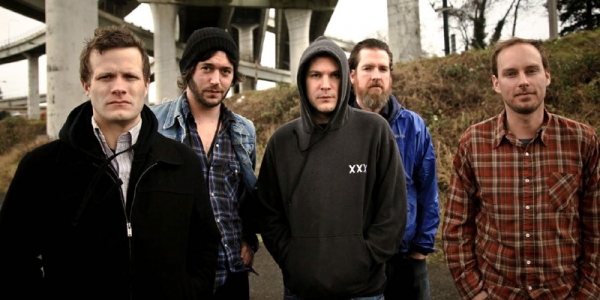“That was at the End Of The Road Festival in the UK awhile back,” laughs Earl, reached on the phone during a day off from the band’s current tour. “We played on the same stage as her, just a few hours earlier. We caught her cruising around backstage afterwards, so we sucked it up and asked for a photo. She was really nice, very friendly.”
While Earl’s intense falsetto is part of Woods’ allure, he remains relatively mild-mannered in conversation. He won’t say much, though there is a certain air of mysticism in his voice when he continues to describe the surroundings of meeting Smith. “She gave a mind-blowing performance that night,” he says. “It was totally inspiring.”
While many were quick to slap the ‘hippie’ label on early Woods releases, the band has steadily evolved throughout their seven full-lengths albums in the past six years.
Still, when it comes to inspiration, Earl isn’t afraid to wax poetic on the subject. “The experience of travelling and being on the road is a big inspiration when it comes to writing new material. I’d say that’s where I get most of my inspiration; seeing new sights, even if it is from the window of the van.”
Their latest full-length Bend Beyond is another step forward for the band. On Bend Beyond, Earl exposes some fairly dark subject matter, married with newfound, sharp and concise arrangements and his trademark falsetto. Much has been made about the band’s turn down dark corners on Bend Beyond. But for Earl, the sound of the record is merely another step for the band.
“I guess I can see it,” he says of recent reviews, labelling the album the band’s darkest. “But for me,” he continues, “it’s along the same lines of previous records, as far as subject matter. It might come across a bit darker because of the approach we took to the production. Perhaps it’s more noticeable, but I tend to gravitate towards that kind of darker stuff. It’s my style, I guess.”
Pressed a little more, Earl reveals that if indeed Bend Beyond features a dark theme, then it certainly wasn’t a premeditated decision. While Woods’ relentless creative output in the last six years means they are anything but casual in their work ethic, Earl insists any changes within the band come naturally. “I don’t usually come up with a theme, but a bunch of stuff always seems to come together at the right time. There’s nothing premeditated. I’m of the belief that things will come together naturally.”
As Earl sees it, Woods evolution has not been a conscious one. “I think if you listen to all of our records, there’s a lot of times where we try new things. I don’t know if people aren’t picking up on it, but to me, each record, from Songs Of Shame, has evolved. And we’ve managed to do it in a way that we’ve always wanted to, as well. While the records may sound similar to some people, I do feel like musically, we’re involved in a process.”
A large part of that process involves Woodsist, the label that houses Woods and has also released records by The Fresh and Onlys, Kurt Vile and Moon Duo. With eight releases so far this year alone, Earls’ quiet, casual demeanour may very well be a front for one of the hardest working people in indie rock. Earl’s decision to start Woodsist allows Woods the kind of creative freedom and control that many bands could only dream of. And it hasn’t hurt their evolution one bit.
“There’s a level of freedom that means we can kind of do whatever we want, which I love,” he says. “On our last record, Sun And Shade, we had a couple of longer, stretched-out jams that I’m not too sure if other labels would have gotten on board with. We have a great foundation with the label, and we’re happy.”
Earl admits that while the band has been approach by other labels, he’s in no hurry to jump ship. That would only complicate matters, and if he believes anything, it’s that the band should continue to evolve as they have: quietly, humbly and effectively. “I like to keep things fairly simple and straightforward,” says Earl. “I like it that way. Short and sweet.”
BY JOSHUA KLOKE







